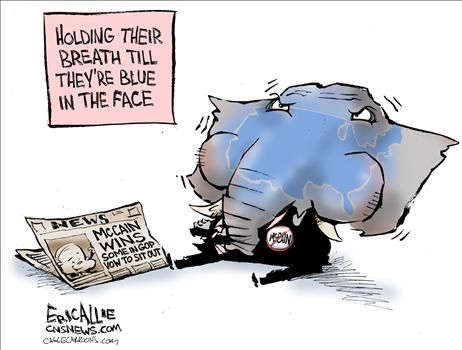sure Iowa and NH aren't exactly the same but is there anything that we can learn from Iowa's results? does this change the race there?
For starters, Iowans ultimately rejected the establishment candidates (Hillary and Mitt), and gave an unexpected level of support to the insurgent candidates Obama and Huckabee. In a result that was unthinkable just a few months ago, Ron Paul outperformed Giuliani by over 2 to 1. Certainly independents and young people played a big role for both Obama and Paul, coming out in numbers that were not anticipated by pollsters. Young and independent voters may come out in even greater numbers for New Hampshire, likely to buck the establishment there again. New England's independents, young people, and liberals are a natural constituency for Obama, so the Iowa win is likely to propel him further in New Hampshire. The beneficiaries of young and independent voters in New Hampshire for the GOP will be less predictable, and probably fall both to Ron Paul and McCain, unless others can make significant inroads.
The big word coming out of Iowa is "change." Hillary and Mitt are already trying to refashion themselves as the real agents of change for New Hampshire voters. It's not likely to work. Clinton and Romney already suffer from appearing stiff and inauthentic. Trying to reinvent themselves once more will feed into the perception of a chameleon politician who doesn't have any real core, especially as try to go after Obama and McCain - who have each built their entire political careers on a theme of reform.
What does each GOP candidates need to do to succeed in New Hampshire? It's been built up as showdown time between Romney and McCain. Indeed, it's hard to see how either one continues if they don't win here. But that doesn't mean either one will drop out if he finishes a close second. Both are still polling high in Michigan, so it might not be the end of the line. But in order to not win and still continue on, it has to be a very close second place.
A month ago McCain was tied in the polls with Giuliani for a very distant second place. Now he's polling right up with Romney at about 30 percent, while Romney's numbers have been basically stagnant. McCain's greatest strength has been his performance in town hall meetings, and to win he needs to keep that up and talk face to face to as many folks as he can. He's really good at that, and it's more meaningful than any television ad he could show. He also needs to keep Romney from dragging him into too much of a mud-fight. He needs to bring the discussion back to his own vision about what we owe America's future, and really demonstrate he's in a different league from Romney. Huckabee may not win over a lot of voters in New Hampshire, but Huckabee's clean campaign strategy will.
Romney has two options right now. He has to either 1) attract undecided voters or 2) keep them at home ( or send them to Giuliani or Obama) by planting doubts about McCain. If he wants to attract new voters, he has to demonstrate his personal side, talk about his own life and struggles, show he's human and not a political robot. His other choice is to continue to go negative against McCain, even if it drives independents away from himself . He can't do both - and if Iowa is any indication, he'll choose the latter, and it won't work there either.
For the other candidates it's not a matter of having to win, but to make a strong third finish.
Giuliani's support in the past month has eroded almost as quickly as McCain's has risen. His best chance for a rebound is if voters buy into Romney's negative ads against McCain without buying into Romney. Since Romney has also gone after Giuliani, this is not very likely. Rudy has been going down steeply, and with results just above Duncan Hunter in Iowa, it's more likely he'll come in behind both Huckabee and Paul than that he will signifcantly recover in the next few days.
Thompson is currently sixth in the polls in NH. Had he made an investment here earlier he might have done well. There are plenty of small government folks here who aren't followers of Ron Paul. He could have reached out to with his commitment to entitlement reform and a less energetic federal government. But it seems too late now.
Huckabee won't have a base of evangelical support like he did in Iowa, but he still could capitalize on his win there to make a strong third-place finish. New Hampshire Republicans are generally - like Huckabee - environmental conservationists, committed to gun rights - and could be very responsive to his call to abolish the income tax.
Finally, if Ron Paul is likely to make a splash anywhere, it will probably be in the "Live Free or Die" State. A strong third place finish here is very possible. While he almost certainly wont win a single state, he has enough funds and enthusiastic support that he wont drop for quite a while yet.
As for Duncan Hunter - if he came in that low in conservative/populist Iowa, I don't know how he expects to make any progress - it's time to pull out. If he's most interested in punishing illegal immigrants he should back Thompson. If he's most interested in stopping free trade he should back Huckabee. If he's most interested in starting WW4 with Iran and China he should back Giuliani. If he's not sure what's most important to him, he should follow Tancredo's lead and back Romney - and I'm betting he just might.





